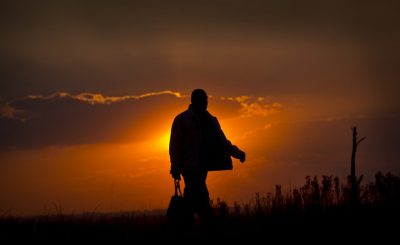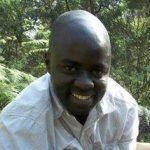By
James Ouma
On a cold lonesome evening in September, a call from my widowed mother changed everything I had believed in. Having lost my dad when I was young I grew up thinking no one really cared about me.
“Hello Godwin,” she said, breathing over the phone.
“Hello ma,” I replied.
“How come you never send me money when I ask?” she asked. “I am very sick and I need your help!”
“I understand but…”
“You keep on saying you have no money,” she interrupted. “How do you survive in the city of Nairobi? Don’t you know that I am your mother?” she asked, hanging up.
As her last words echoed in my ears I thought about my childhood. My father passed on before my thirteenth birthday. And even though I had other siblings I grew up feeling there was something wrong and there was something my mother wasn’t telling me. Our African traditions being what they are, my distant uncles, aunts and other relatives made it clear that I was not welcome. They made me feel like I was a stranger in the family.
And much as I wanted to get the answers that would set me free, I was between a rock and a hard place. Not knowing where to start I built a wall around me which affected my education and association with other children at school and in our village.
When I became old enough I finally confronted my mother and true to form she did not reveal the identity of my biological father. Nor did she deny the fact that I had been born outside of wedlock. I became confused and angry that I was further from knowing the truth than I had ever been. From that time on our relationship never remained the same.
Even after I left home a few years later and came to the city I still wanted to know who my biological father was. Sometimes I thought it did not matter at all. But most of the time I felt knowing the identity of my biological father would set me free. Don’t ask me why, I just thought knowing him would free me from the bondage that not knowing him had brought upon me.
Exactly a year before my mother called, I left the city early in the morning to visit my mom in the village. On my way there I made a stopover in Kisumu Town where Candace, my sister, was staying with her husband and two children. When I arrived, Wendy her daughter, ran into my open arms. As we stood there hugging each other it occurred to me that Wendy, having been born out of wedlock, just like me, longed for fatherly love and affection. Her step father had never hidden the fact that she was an unwelcome addition to his family.
And even though the differences in our ages separated us, I thought we had something in common. Both of us did not know who our biological fathers were. And while the man I had known as my dad had treated me well, Wendy’s step father was the exact opposite.
He never bought Wendy school uniform, books or anything. He left that responsibility to Candace, my sister while Wendy’s brother never lacked for anything. I don’t know whether this is a universal trend, but for some reason it made me spend sleepless nights thinking about how the many children I saw being born out of wedlock that were going to suffer in future. Unlike in the past, a good number of teenage girls were giving birth and dropping out of school to take care of their children.
Nearly every household both in the city and back in the village had young girls who had given birth out of wedlock and the number kept growing with each passing day. And while the girls bore the brunt of bringing children on their own, the fathers responsible were not in any way held accountable. I wanted this to change. I had therefore taken it upon myself to make it my life’s mission.
About three hours later Wendy and I left hand in hand. It was inside the bus as we sat side by side that I gave serious thought to the difficult mission I was embarking on. I was finally going to know the identity of my biological father. And this time round I was going to let my mother know I meant business and wasn’t going to take no for an answer. I extended my hand and grabbed Wendy’s. As the bus negotiated its way towards our destination, my mind strayed back to my childhood.
My childhood had never been a walk in the park. I grew up feeling there was an empty vacuum that longed to be filled with fatherly love, acceptance and appreciation. Because of this, I grew up having the lowest of self-esteem. This began after the man I had thought was my dad passed away. I was thirteen when it happened. What happened next is still clear in my mind. Immediately after the funeral my mother, siblings and I gathered with our relatives inside our grass-thatched and mud-walled hut. The meeting was convened for the purpose of convincing her to honour the Luo ways of life which dictated that a widow gets inherited by one of her in-laws.
Since my mother refused to do so, our relatives warned her of the dire consequences that would befall our family. We were still too young to realise the impact of this simple decision. We were declared outcasts throughout the whole village and children from the village were warned not to associate with us.
Soon everyone began waiting for us to die from chira, a disease that attacks anyone who dares go against our traditions. Years came and went and nobody died in our family. But we suffered a lot from being isolated by people who were supposed to help us develop into better human beings. Because our mother was not allowed to work on our farm by the virtue of failing to fulfill our traditions, we never had enough food.
Our house soon began leaking while its walls caved in from disrepair. Our house leaned towards one side and every time I looked at it I feared it would topple and leave behind a rubble of dried soil and splintered wood to show for what used to be our humble house. Despite this life went on as if nothing had happened to our family. Villagers went about their normal lives disregarding the fact that we needed their help. But despite all this, our mother stood her ground.
A few years after the man I had known as dad had passed away I made a discovery that ruined my relationship with my mother. My aunts and grandmother soon started treating me as if I didn’t belong. They started treating Gregory, my younger brother, as the first born of the family. It reached the point where I started to think more about my biological father, who I never knew. When I confronted my mother about the issue having completed high school, she refused to tell me anything. This made me withdraw into a shell and a wall that no one could penetrate.
I was deeply wounded and felt betrayed by my mother who would soon drag me to Sunday school. I loved going to church because of the good things Christianity has done. But deep inside me was a vacuum that prayers alone couldn’t fill. I began drifting along without purpose like a piece of wood that is tossed by the ocean’s restless waves.
For many years, I spent my life seeing another new day slowly pass by. I was helpless. My mind was in turmoil.
Sitting with Wendy inside the bus gave me the rare opportunity of putting things in a clear perspective. My aim of traveling to the village to see my mother was for the purpose of knowing the identity of my biological father. As Wendy and I sat side by side, I thought about the issue of fatherhood and what being a man meant. I thought about my biological father who had made my mother pregnant. Even though I was to meet him I knew he had not been a good man. Had he been good he would have married my mother. All he had done was take advantage of my mother’s naivety before abandoning her at the time she needed him most. I examined myself as a man. I thought of the many times I had taken advantage of women. I looked back and thought about my actions and I felt inadequate. And though I was yet to hear a woman say I had made them pregnant I decided to start being responsible.
“Mother,” I said when Wendy and I finally arrived home.
“Yes, my son,” she replied.
“I would like you to tell me about the man you got married to,” I said sitting next to her on the two-seater chair.
“Your dad, may God bless his departed soul,” she began with a twinkle in her teary wrinkled eyes, “was a very good man. I met him when you were a year old.”
For the first time in my life I sat close to my mother on the same chair without feeling embarrassed or out of place. I was finally home where I truly belonged. I was experiencing what it really meant to be free. As she cradled me, enveloping me with her arms and holding me close to her chest, I felt tears drop from my eyes and for the first time in my life I wept in joy. I listened as she narrated how she had fallen pregnant and dropped out of high school when she was still a teenager.
She told me how the people she had thought loved her abandoned her in her time of need. The man who had made her pregnant bolted and left the village while her parents asked her to leave their home because she had brought shame to them. My mother packed her few belongings and left to take care of her pregnancy and me.
“What happened next?” I asked.
“I met so many men who were interested in marrying me,” she replied. “But they gave up their interest the moment they heard I had a son out of wedlock. I was almost giving up hope of getting married when I met your dad.
“And what did my dad say when you told him about me?” I asked, my heartbeat echoing inside my eardrums. “What did he say?” I asked, holding my breath, waiting.
“He said you were and will always be his son,” my mother replied wiping tears from her flooded eyes. “Godwin, your dad loved and treated you like one of his own. You were flesh and blood to him.”
With this revelation I turned a new page in my life. I started counting my blessings by being grateful for what life had given me. My mother and I were reconciled and before I came back to Nairobi I promised to support her and be grateful for the man who had accepted me as his own flesh and blood.
That had been a year before. Now my mother needed my help. Two days before her call, a friend of mine gave me some money so I could pay my rent which was long overdue. In fact I had, just before receiving my mother’s call, promised my landlord that I was going to wire the money through Mpesa to him.
But as my mother’s last words echoed in my ears I suddenly knew what to do. Deep in my heart, I knew there were no two ways about it.
My mother needed a grain of happiness more than I did.



No Comments Yet!
You can be first to comment this post!